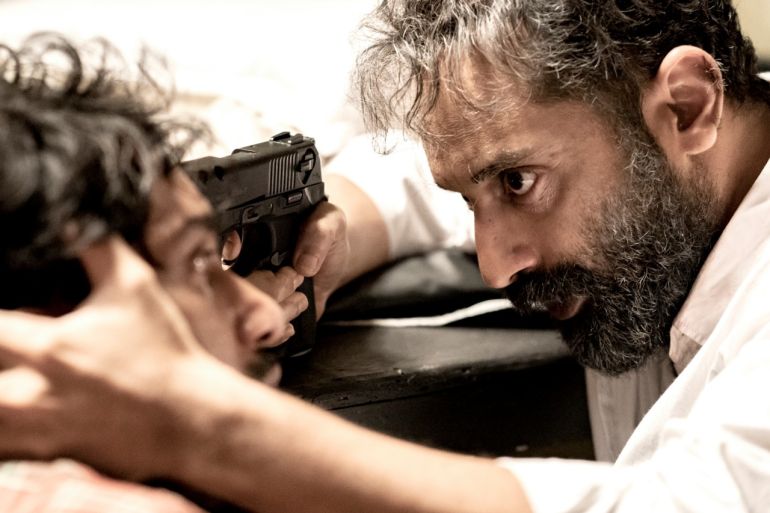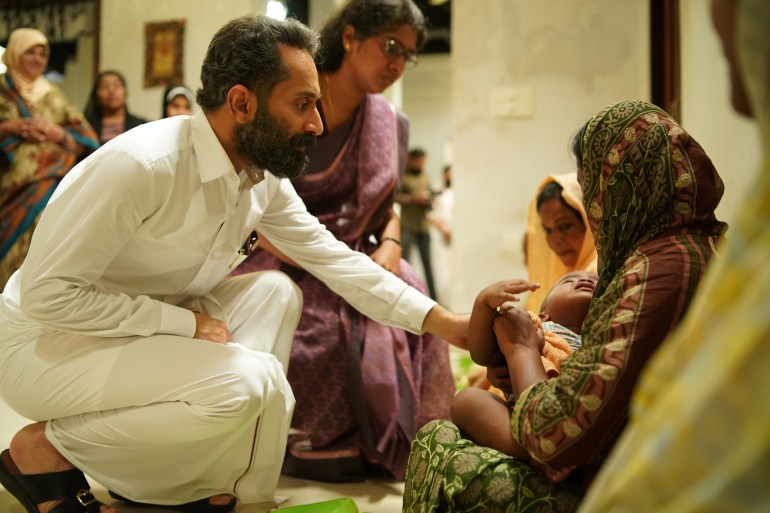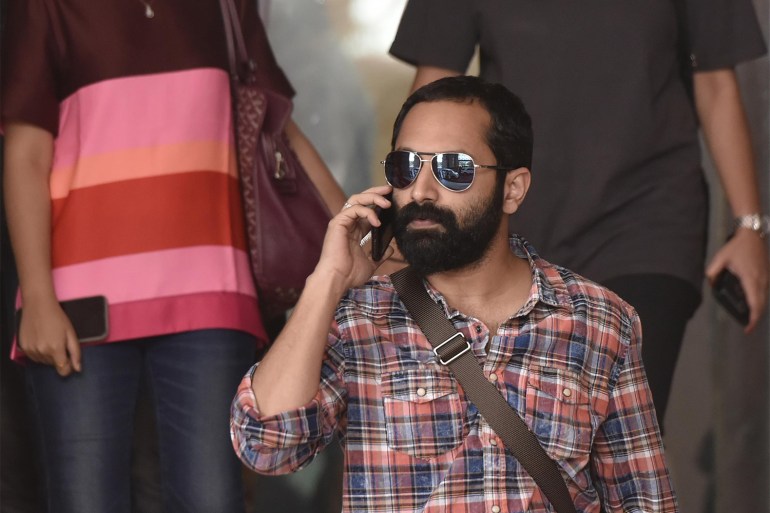Fahadh Faasil: Crusader of a New Wave in India’s Malayalam cinema
The 38-year-old actor-producer makes a mark by choosing unorthodox, experimental subjects instead of embracing mainstream narratives and aesthetics.

New Delhi, India – If Fahadh Faasil, a star of Malayalam language cinema in India’s Kerala state, were to write a rulebook on filmmaking, its key canons would be authenticity and honesty.
“Cinema should be as real as looking out of the window. Everything has to be as real as how you experience it,” says the 38-year-old actor-producer on the eve of the release of his new film, Malik, on Amazon Prime Video.
Keep reading
list of 4 items‘We won’t shut up’: Muslim women put up ‘for auction’ in India
Technology meets tradition: Kerala’s robotic leather puppets
Tired of Muslim ‘terrorists’, charity tackles cinema stereotypes
Faasil’s touchstone for his films – whether a romance, comedy, period drama, gangster saga or thriller – has been plausibility. His characters – black, white, or grey – must be credible.
“The audience should be able to relate to the stories,” he told Al Jazeera in a telephone interview.

Malik, directed by Mahesh Narayanan, with whom Faasil has done some commendable work, is a substantive addition to the actor’s celebrated filmography of nearly 50 titles.
The film is as much a continuum for Faasil as it marks a significant new turn in his 20-year journey in cinema. A shift in gear, a possible game changer for someone who is considered the main protagonist of a “New Wave” in Malayalam cinema.
In Malik, Faasil plays the titular character, Sulaiman Malik aka Ali Ikka, a man of humble origins who indulges in smuggling, politics, crime and corruption to become a leader of his people and the community.
So for someone who has until now played the Ordinary Joe, the idiosyncratic guy next door or, lately, the twisted psychopath, Malik is a first – a textbook hero with an epic sweep, span and mass appeal.

The actor had to live through various stages in the life of the character – from his youth to old age. It marks another first for Faasil, considering he had not yet played a character older than his actual age.
“The film shows 30 years of the life of the character. It is not just me who is going through the time leap, every actor in the movie is growing in that sense. That was the challenging aspect – to portray that growth … With this movie, I have pushed myself,” Faasil told Al Jazeera.
Initial challenges
Such challenges, however, are not new for the actor, whose initial years in cinema were not as rewarding.
Faasil made his cinematic debut in 2002 at the age of 19 in a romantic film, Kaiyethum Doorath, directed by his father Fazil. But the movie flopped and so he took a long sabbatical, by enrolling in an engineering course in the United States.
But he lost interest in the discipline, quit his course halfway and started attending acting workshops.

He caught the public eye on his return to the big screen seven years later in the anthology film, Kerala Café (2009), in which he starred in spooky short Mrityunjayam.
“He brought in a very different vibe – cool, casual. A young energy came into the films. He was like a breath of fresh air,” remembers writer Vivek Ranjit.
The dealbreaker was the Sameer Thahir thriller, Chaappa Kurishu (2011), for which Faasil received Kerala State Film Award for the Best Supporting Actor.
Despite coming from a privileged film family – his father introduced some of the biggest names in Malayalam cinema, including Mohanlal in Manjil Virinja Pookkal – Faasil chose not to get straitjacketed.
Even as a fledgling actor, the actor chose unorthodox, experimental subjects, instead of embracing the mainstream narrative and aesthetics.
In a negative role in 22 Female Kottayam (2012), he gets Bobbitised – a reference to a US woman who cut off her husband’s genitals in 1993 – by the avenging heroine, something no macho hero would dare portray on screen.
‘Character … only one layer of film’
Faasil explains his penchant for the unconventional. “It can be a normal story placed in an unconventional setting or an unconventional character in a conventional scenario. Even if it is a remake, I like to hear [and see] it [done] in a different way.”
While deciding on a film, he does not look at his character’s role but at the narrative and the screenplay first.
“For me, the most important is the story and the techniques that have been used to convey it. The character actually forms just one layer of the film,” he says.
In his case, it helps that he is a keen observer of life and an avid viewer of cinema.
Director Narayanan says he likes Faasil’s transparency, openness and patience, his willingness to discuss and to take as well as offer feedback.
“He is on the sets with total clarity about the script,” he says.
Film festival consultant and arts manager Bandhu Prasad Aleyamma says Faasil “has the ability to understand a story, pick up and envisage the cinematic possibility of a story”.
The year 2013 proved to be an especially busy and fruitful year for Faasil, dotted with successful films including the interfaith romance Annayum Rasoolum, the musical Amen and the romcom Oru Indian Pranaykadha.
He was delightful as a man with a obsessive-compulsive disorder in North 24 Kaatham, and just as riveting as a self-centred, egotistical artist in Artist. The two roles jointly got him Kerala State Film Award for Best Actor that year.
After the runaway success of the ensemble romance Bangalore Days (2014) came another bad phase – two years of failures – until Dileesh Pothan’s directorial debut Maheshinte Prathikaaram (2016) broke the jinx and marked Faasil’s second wave of successes.
While Sathyan Anthikad’s humane life lessons in Njan Prakashan (2018) set new box office records, Pothan’s deceptively simple yet profound film centred on the theft of a gold chain, Thondimuthalum Driksakshiyum (2017), won Faasil India’s national award for the best supporting actor.

Faasil set up his own production house, Fahadh Faasil and Friends Pvt Ltd., along with his wife and fellow actor Nazriya Nazim, debuting as a producer with an unusual period thriller, Iyobinte Pusthakam (2014).
Enabler of New Wave Malayalam cinema
Over the years, he has been a seminal enabler for what is called the New Wave Malayalam cinema. He helped bring together a diverse pool of talents, including filmmakers Pothan, Narayanan, Sanu John Varghese and writer Syam Pushkaran.
The new talents worked on out-of-the-box ideas and projects together. Working collaboratively they used each other as sounding board.
“Everyone is a part of each film. It is ‘our’ film rather than an individual’s,” says Narayanan.
It was in 2019, with the subtitled theatrical release of films such as Madhu C Narayanan’s Kumbalangi Nights and Thiagarajan Kumararaja’s Super Deluxe (in Tamil language) that Faasil started getting recognised nationally by cinephiles.
Video-streaming platforms and the success of C U Soon, an experimental film that has screens within screens and Joji, Pothan’s take on Shakespeare’s Macbeth, released during the COVID-19 lockdown helped Faasil become a household name.
“Everyone can watch everything now. I can sit at home and watch a Spanish series. Similarly, someone else in some other part of the world can watch Malayalam movies,” says Faasil.
Malik’s theatrical release had been scheduled for April last year but the coronavirus pandemic forced it to become the second major Malayalam film after Drishyam 2 to be released online.
The first look poster of actor #KamalHaasan and director #LokeshKanagaraj's upcoming film, #Vikram, is out! @RKFI | @Dir_Lokesh pic.twitter.com/YkmO4BLqsF
— Silverscreen.in (@silverscreenin) July 10, 2021
While the Kerala film community had been largely resistant to OTT (over the top media service) platforms, Faasil was one of the first to court it, now considered a winning move in retrospect.
“This is the time to move on and adapt to the newer ways and go hand-in-hand with the changing times. Our purpose is to entertain the audience,” he says.
Faasil says it is important for him for the audience to like a film, irrespective of the medium. What clicks, as he keeps stressing, is honest emotions.
“I do films with emotions, and that, in turn, travels across borders and connects with people.”
Malik is Faasil’s third outing with Narayanan as director, after Take Off and C U Soon.
Vijay Subramaniam, director and head of content at Amazon Prime Video in India, says what makes Faasil stand out is “his unerring choice of stories and excellent performances”.
Malik might be reminiscent of Don or Michael Corleone in Francis Ford Coppola’s Godfather series, or the character of Velu Naickar in Tamil director Mani Ratnam’s Nayakan.
However, unlike the flamboyance of thespians such as Marlon Brando, Al Pacino and Kamal Haasan, Faasil plays it in his trademark style – seemingly easy, effortless and light. It is a performance laced with quietude, almost self-effacing, yet at the same time, larger than life.
Faasil’s messiah is characteristically grounded and real.
The film also draws from current issues and incidents – land encroachments along the Indian coastline and the concomitant ecological damage, the political and corporate corruption.
Meanwhile, the Narayanan-Faasil team continues to be on a roll. The actor would be starring next in Sajimon Prabhakar’s Malayankunju, a survival thriller written by Narayanan, who will also be its cinematographer.
The recent unveiling of the first look of Lokesh Kanagaraj’s Vikram, Faasil’s third Tamil film, with Kamal Haasan and Vijay Sethupati as co-stars, attracted glowing reviews on Twitter.
Faasil is also all set to do his first Telugu film, Pushpa, with Allu Arjun.
Is there a Hindi film on the horizon? Not until he is absolutely fluent in Hindi, he says.
“It’s not that I can’t speak or understand Hindi, but I also need to think in the language to be able to improvise a scene,” he says.
After all, for Faasil, it is always about keeping it authentic and honest, credible and real.